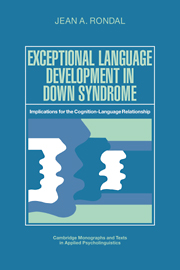 Exceptional Language Development in Down Syndrome
Exceptional Language Development in Down Syndrome Book contents
- Frontmatter
- Contents
- Foreword by Neil O'Connor
- Acknowledgments
- 1 Introduction
- 2 Language development in Down syndrome
- 3 Exceptional language development in mentally handicapped individuals
- 4 Cognition-language relationships and modularity issues
- 5 A case study
- 6 Theoretical discussion
- 7 General conclusions
- Appendixes
- References
- Index
Foreword by Neil O'Connor
Published online by Cambridge University Press: 23 December 2009
- Frontmatter
- Contents
- Foreword by Neil O'Connor
- Acknowledgments
- 1 Introduction
- 2 Language development in Down syndrome
- 3 Exceptional language development in mentally handicapped individuals
- 4 Cognition-language relationships and modularity issues
- 5 A case study
- 6 Theoretical discussion
- 7 General conclusions
- Appendixes
- References
- Index
Summary
This intriguing study of a Down syndrome subject by Professor Rondal has a wellgrounded basis in the very early studies of thought and language and their interconnections by the two outstanding psychologists Piaget (1923) and Vygotsky (1929/1962) who both addressed the problem of the relationship between language and thought. At that time, the interaction of the two was seen in simple developmental terms in such a manner that, for example, thought could at first occur in the absence of language and subsequently speech or language could develop in the child in such a way that at a certain stage “thought could become speech and speech thought,” as Vygotsky expressed verbal development in children. However, two aspects to these kinds of studies distinguish them from more recent studies of the interaction of speech and thought. They do not reflect the complexity of current psycholinguistics, on the one hand, and they do not study abnormalities of language development, on the other. An exception to the latter point are the studies of Luria (1961), in which linguistic deficiencies in the control of behaviour are referred to, and in some instances Luria suggests that weakness in the control of motor behaviour in some oligophrenic children can be compensated for and brought under better control through the supplementary use of speech. In this kind of study, Luria makes use of Pavlov's differentiation of the primary (conditioning) and secondary (speech) signalling systems. The major difference between the two systems is, of course, the additive but slow action of conditioning as compared with the immediacy and generality of the secondary (speech) system.
- Type
- Chapter
- Information
- Exceptional Language Development in Down SyndromeImplications for the Cognition-Language Relationship, pp. ix - xiPublisher: Cambridge University PressPrint publication year: 1995


